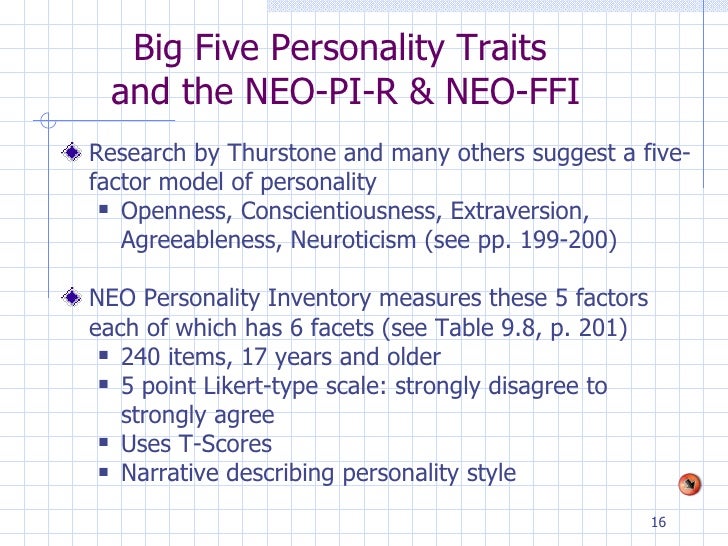On this site, we discuss ongoing strategies, ideas and plans for sustaining ongoing foundation for mental health and wellness.
If you or anyone is struggling or in crisis right now, please call 911 or visit the nearest emergency room. Alternatively, crisis resources can be found here.
- Big 5 Personality Inventory
- Scoring The Big 5 Personality Inventory
- Big 5 Personality Inventory Pdf
- Big 5 Personality Inventory Test
- Big 5 Personality Inventory Printable

What is the Big Five Personality Inventory?
The International Personality Item Pool and the future of public-domain personality measures. Journal of Research in Personality, 40, 84-96. A broad-bandwidth, public domain, personality inventory measuring the lower-level facets of several five-factor models. Of the most researched personality assessment tools are the Big Five Inventory and variations of the Five-Factor Model. These tools are often used interchangeably in personality research, and for the purposes for the purposes of this study they will be here as well.
With a name like The Big 5, I know that it can pique people’s curiosity, so I thought it’d be interesting to discuss here in more details about the Five Factor Personality Model.
Many people are familiar with Myers Briggs Type Indicator tests, but The Five Factor Model of Personality or the Big Five is another model that can help you have a better understanding of yourself by understanding your personality traits.
At the very least, it’s a fun discussion point to be had with friends, but it can also be a self-assessment tool to help you understand deeper patterns in your life.
Personality traits are natural tendencies, but they can be improved upon by understanding and possibly working on emphasizing or de-emphasizing certain traits.
I think it’s important to note that traits does not mean that our ultimate potential is set in stone, but it can give you a sense of where your baseline is at the moment.
While there are other personality trait models, the Five Factor Model emerged as one that is widely accepted as describing the more essential personality traits.
Not only can it be interesting to learn more specifically about your traits, it can also pinpoint strengths, as well as areas of improvements if you are finding gaps in certain areas of your life.


For instance, if your score is very low in conscientiousness, it could be that you have a tendency to be disorganized and not meet deadlines at work. Having it come up in a test like this can give you an insight that it could be an area of improvement to work on.
The Big Five Personality Traits can be summed up the acronym: OCEAN and each trait is measured between a scale of 1 to 100%.
Openness to experience (inventive or curious versus consistent or cautious).
Openness describes an individual’s tendency to think in complex, abstract ways.
People high in Openness are creative, unconventional and artistic.
Whereas those who are low are more practical, conservative and conventional. Average score is approximately 58%.
Conscientiousness (efficient or organized versus easy-going or careless).
Conscientiousness describes a person’s tendency to be persistent and determined in achieving their goals.
People high in Conscientiousness are orderly, ambitious and dependable.
Those who are low are spontaneous, impulsive and disorganized.
Average is around 55%
Extraversion (seeking outside stimulation versus preferring internalized introspection).
Extraversion describes a person’s tendency to be energized by being around other people versus being by oneself.
Those who score high are energetic, enthusiastic and excitable.
Those who score low are more reserved, calm and introspective.
Average is around 51%.
Agreeableness (friendly or compassionate versus challenging or detached).
Agreeableness describes an individual’s tendency to put the needs of others ahead of their own needs.
Those who score high are accommodating, helpful and selfless.
Those who score lower are competitive, argumentative and brash.
Average score is around 63%.
Neuroticism (sensitive or nervous versus secure or confident).

Neuroticism describes an individual’s response to stress.
Those who score high are more anxious, moody and self-conscious. Those who score lower are more stable, resilient, optimistic and self-confident.
Average score is around 54%.
How can the results of the test be used for personal development?
Big 5 Personality Inventory
There is a lot of different take-aways from these kinds of personality test results.
But using the test results to identify areas of improvement can be be helpful for overall well-being.
Scoring The Big 5 Personality Inventory

Big 5 Personality Inventory Pdf
One example is that if someone scores lower on Neuroticism which would mean that working on emotional resilience or fitness to maintain more inner balance and sense of self, can improve quality of life by feeling more stable in general.
Big 5 Personality Inventory Test
Free test can be taken at the Open Source Psychometrics Project website.
Big 5 Personality Inventory Printable
Or a paid one that provides a lot more personalized test results can be found at a website called Truity.com.